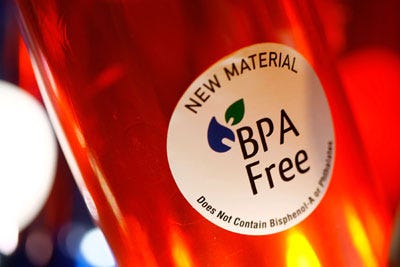I went to purchase a plastic coffee mug the other day, and as I looked at the various selections, one caught my eye. Highlighted all throughout the packaging was, "made from durable, BPA-free plastic."Soon, we might be seeing the BPA-free label on not just select items, but on all of food and beverage packaging.It was recently announced that the U.S. Food and Drug Administration (FDA) will make a decision by the end of this month on whether to the ban the use of bisphenol A (BPA) in food and beverage packaging.
March 12, 2012
I went to purchase a plastic coffee mug the other day, and as I looked at the various selections, one caught my eye. Highlighted all throughout the packaging was, "made from durable, BPA-free plastic."
Soon, we might be seeing the BPA-free label on not just select items, but on all of food and beverage packaging.
It was recently announced that the U.S. Food and Drug Administration (FDA) will make a decision by the end of this month on whether to the ban the use of bisphenol A (BPA) in food and beverage packaging.
BPA, which is present in most food and beverage cans, is a widely used industrial chemical to make polycarbonate a hard clear plastic. It is typically used in food and beverage packaging because it helps the product withstand the high temperatures of the sterilization process and, overall, increases products' shelf life.
 But physiologically, BPA mimics the hormone estrogen and has been linked to increased breast cancer risk. In addition, about 90% of Americans have traces of bisphenol A in their urine, according to the Endocrine-Related Cancer Journal.
But physiologically, BPA mimics the hormone estrogen and has been linked to increased breast cancer risk. In addition, about 90% of Americans have traces of bisphenol A in their urine, according to the Endocrine-Related Cancer Journal.
Although some studies indicate current, low levels of human exposure to BPA are safe, the FDA and the National Toxicology Program at the National Institutes of Health "have some concern" about BPA's potential effects on the brain, behavior and prostate gland in fetuses, infants and young children. The government is spending $30 million to study the chemical's effect on people.
If the ban goes through, the FDA will follow the lead of French lawmakers who voted to keep BPA away from food packaging, beginning in 2014. Canada, in 2007, banned BPA in bottles, and Denmark has banned BPA in all baby-food products.
In February, the USDA Foreign Agricultural Service released a report on the potential impact of the French ban on U.S. exports.
The report discussed how Dow Chemical and Bayer AG produce "the bulk of BPA in the world," and it is estimated that most, if not all canned drinks and canned foods, as well as many drinks and food in plastic containers, are in contact with BPA. In addition, BPA is found on about 10% of plastic containers (those made with polycarbonate) of the U.S. Tupperware brand. None of Tupperware's children products contains BPA.
The report went on to say that this ban in France could "jeopardize the U.S. processed and other food exports to France." The primary products targeted will be beverages, notably Florida orange and grapefruit juices using plastic containers; France is the second-largest market for Florida juices with $21 million in sales. Imported beer will also be targeted by this action, and this law may affect any product that contains a plastic packaging or a plastic component, the report stated.
However, the report did state that many companies have developed non-BPA containers and BPA alternatives.
Several U.S. companies have already started to remove BPA from its food packaging, such as Hain Celestial, ConAgra, H.J. Heinz, and, to a lesser extent, General Mills and Nestlé. Other U.S. food companies such as Eden Foods, Muir Glen, Edward & Son, Trader Joe's, Vital Choice, Wild Planet Foods, Oregon's Choice Gourmet, and Eco Fish, among others, also package all or part of their product in BPA-free containers.
"Thus, proponents of the French bill say that a ban on BPA food packaging, if implemented wisely, could provide some market opportunities to innovative U.S. companies," the report stated.
What are your thoughts about the potential BPA ban? How will it impact the industry and your company? Does it provide an opportunity for companies to innovate?
About the Author(s)
You May Also Like


